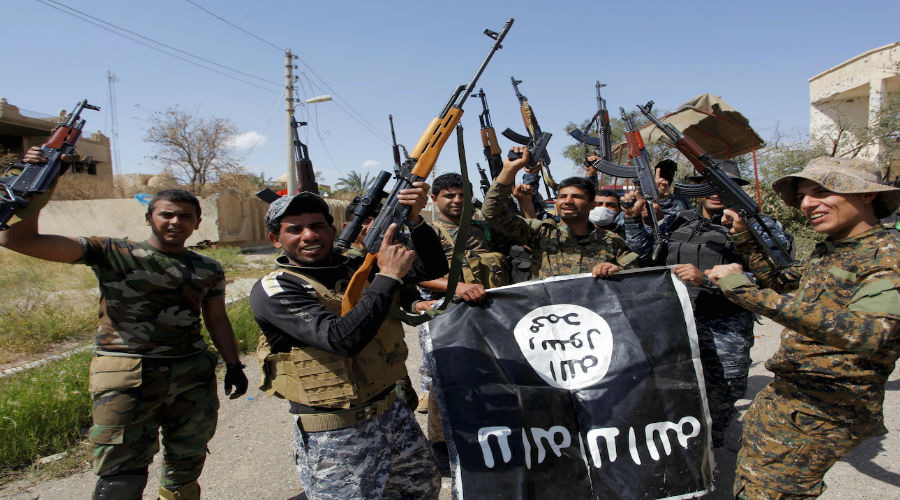Terrorist organizations in several regional countries, especially crisis states, have shown keen interest in the marked decline of Islamic State’s (ISIS) capabilities on several levels, after the group lost key areas under its control in Iraq and Syria. ISIS has also suffered from high losses in its ranks from military strikes.
The lack of force is especially apparent after the start of the international coalition's Iraqi-Peshmerga operation to liberate Mosul. According to several estimates, ISIS has lost more than 1,000 combatants on several fronts, and was forced to retreat from several areas and villages under its control because of pressure from military strikes.
There is no doubt that the battle for Mosul is of special importance for ISIS, and even other terrorist groups, since it may be the prelude for the next battle – liberating Raqqa, ISIS’s headquarters. Many believe this battle will have a direct impact not only on ISIS’s influence in that area, but also its relationship with other groups, whether they be allies or adversaries.
Intertwined developments:
The threat to ISIS could explain why some terrorist groups have recently escalated their, in order to threaten forces involved in the war against terror. These attacks come at a time when Republican candidate Donald Trump emerged as the president elect in the US elections, and there has been an escalation in the battle to liberate Mosul from ISIS control. Accordingly, the Taliban, which entered into an open power struggle with ISIS in Afghanistan, has claimed responsibility for the attempt to storm the German consulate in Mazar Sharif on Nov. 10th,, 2016, which killed seven people and injured 128 others.
The Taliban also carried out a suicide attack at Bagram airbase, the largest US military base in Afghanistan on Nov. 12th, killing four Americans including two soldiers and two contractors.
Meanwhile in Nigeria, Boko Haram – which pledged allegiance to ISIS in March 2015 – quickly sent a message to Trump on 13 Nov. 13th,, 2016, stating that, “the war is still in the beginning,” after the group carried out two suicide attacks in Maiduguri in northern Nigeria on Oct. 28th,, 2016. The attacks killed nine and injured 24.
Bulwark
Although disputes and competition are the main features of relations between ISIS and other terrorist groups, especially after the former succeeded in recruiting elements from its competitors in countries such as Afghanistan, Nigeria and others, some of these terrorist groups view ISIS as their first line of defense. This means that if ISIS falls, or substantially retreats, it could put a lot of pressure on them when international and regional powers fighting ISIS continue their efforts to confront terrorism in the region in preparation for their final elimination.
In other words, although some of these groups are concerned about ISIS’s expansion into areas where they are present, this does not mean these groups did not benefit from the expansion itself. This is because the powers fighting terrorism are focused on ISIS – the main threat to their security and interests, particularly because of their ability to shift the fight outside of the Middle East.
Naturally, statements by officials from countries participating in the war on terror claim that military operations are not limited to fighting ISIS , causing some groups to reject the war, criticizing and sometimes threatening the countries involved. At the same time, these groups provide moral support to ISIS and a legitimate cover for it by not condemning it, a sort of “silent approval”.
Many repercussions:
The decline of ISIS’s influence in Iraq and Syria may theoretically serve the interests of Al-Qaeda and its branches in other countries for two reasons. First, competition was the main feature of relations between the two sides because ISIS succeeded in recruiting fighters from Al-Qaeda, and forming terrorist groups associated with it in areas under Al-Qaeda control.
Second, the decline in ISIS’s influence, capabilities and territories, has caused some of fighters to return to their mother group, Al-Qaeda. Especially since ISIS continues to fail to hold onto areas it has seized since mid-2014. This would mean that the ideology the group used to attract large number of sympathizers was flawed.
Nonetheless, Al-Qaeda is especially concerned about possible repercussions from ISIS losing influence, especially since some dominant currents within the group believe they will be the next target after ISIS is defeated and expelled from areas under its control.
Numerous preconditions:
The aforementioned currents in Al-Qaeda believe the best option for them is for ISIS to maintain its stronghold in Iraq and Syria as long as possible, but without its former capabilities which propelled them to the forefront of terrorist organizations in recent years – previously Al-Qaeda was the top ranking group. Meanwhile, ISIS branches in several countries such as Afghanistan and Nigeria are collapsing. They are a direct threat to Al-Qaeda’s influence, and getting rid of them would increase the group’s ability to redeploy in areas under the control of these groups.
Direct impact:
Terrorist groups that pledge allegiance to ISIS believe military operations against the group in Iraq and Syria will negatively impact them, since one of the reasons to join ISIS originally was to receive assistance from the group to boost their capabilities in carrying out advanced terrorist attacks in their local areas. If these groups lose that capability, some members could defect and join rival terrorist groups.
This potential for defection could explain why some groups have broadened their terrorist attacks recently, in tandem with an escalation in military operations against ISIS in Iraq and Syria.
Accordingly, the positions of some terrorist organizations regarding the gradual decline of ISIS’s capabilities clearly indicate that “interests” not “ideology” are the key variable in deciding possible relationship scenarios among these groups. Additionally, ongoing disputes among them are confined to achieving the most gains overall, rather than smaller victories


